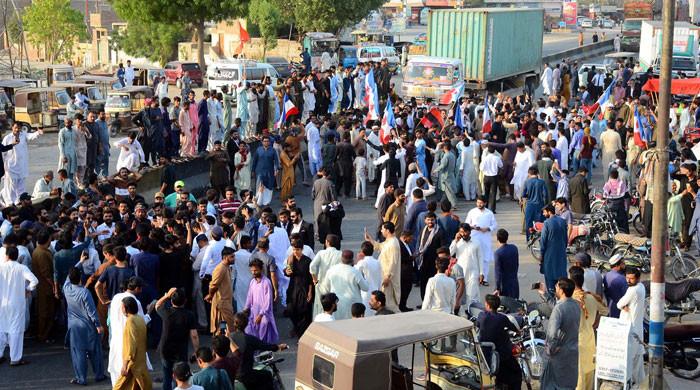Me shaking hands with Opposition leader will normalise corruption: PM Imran Khan
"If I shake hands with him, I will give the message that this [corruption] isn't a bad thing," PM says
November 04, 2021

- PM Imran Khan explains why he avoids shaking hands with Opposition leader Shahbaz Sharif.
- Says corruption cases worth billions of rupees are filed against Shahbaz.
- PM meets envoys from Muslim countries; stresses need to guide youth.
ISLAMABAD: Prime Minister Imran Khan on Thursday said him shaking hands with Leader of the Opposition in the National Assembly Shahbaz Sharif would destigmatise corruption as he reiterated his resolve to rid the country of the menace.
"People ask me why I don't shake hands with [Shahbaz] as he is the Opposition leader," the prime minister said as he addressed a ceremony at the Academy of Letters after inaugurating the "Hall of Fame".
"Corruption cases worth billions of rupees are filed against him. If I shake hands with him on top of that, then I will give the message that this [corruption] isn't a bad thing," he said.
The prime minister, giving the example of England, said that even if a politician is suspected of siphoning public money, neither do anchors call them on TV, and nor do they attend parliamentary sessions till they clear their name.
"Over there, it is unfathomable that a person guilty of corruption worth billions of rupees would go to the parliament and deliver a two-hour-long speech," he said.
The prime minister said the standards of such countries are "different from ours".
"This is why I have established the Rehmatul-lil-Alameen Authority," he said, as he called on intellectuals and scholars to provide the best guidance to the youth to cope with the modern challenges arising amid the digital era.
We cannot ban social media and the internet, so the only way to protect our younger generations from the negative impact of digital innovation is to familiarise them with the moral and ethical standards set by the Holy Prophet Muhammad (PBUH), he said.
PM Imran Khan said a great responsibility lies on the shoulders of film and TV producers to guide younger generations in the right direction through their productions.
PM meets envoys of Muslim countries
Separately, the prime minister interacted with envoys of Muslim countries on the establishment of the Rehmatul-lil-Alameen Authority, a statement from the PM Office said.
The prime minister held an interactive session with the resident ambassadors of Muslim countries, outlining the concept and vision underlining the establishment of the authority, said the statement.
Stressing that the Holy Prophet (PBUH) was a blessing for all humanity, the prime minister underscored the appeal of Islam’s universal message and the bounties of following the fundamental precepts of Riasat-e-Madina.
To achieve real social welfare and progress, the prime minister termed it imperative that the life and teachings of the Holy Prophet (PBUH) are fully understood and emulated by Muslims in their daily lives, he said.
The prime minister elucidated that the prime objective of establishing the Rehmatul-lil-Alameen Authority was to develop a deeper understanding of the Sunnah through collaborative research and to provide essential tools to the youth to preserve their Islamic identity, values, and culture in the face of diverse social and digital media influences.
He said that the Rehmatul-lil-Alameen Authority was mandated to coordinate with Islamic scholars around the globe to discuss contemporary issues faced by the Muslim youth and to present a coherent and logical intellectual response to modern challenges, in particular Islamophobia.
The premier emphasised teaching ethics in schools to help build the character of the Muslim youth in accordance with the principles and the true spirit of Islam.
In this regard, the prime minister also highlighted the importance of the role of print, digital, and electronic media and the influence of their content on the lifestyle and personality development of the young generation.
During the session, the premier invited constructive ideas from the envoys and hoped for active collaboration among Muslim countries, both at the governmental level, as well as through interaction among scholars and academia.
Several envoys appreciated the prime minister's initiative, acknowledged his vocal support for causes of the Muslim Ummah at every international forum, and assured all possible cooperation.












